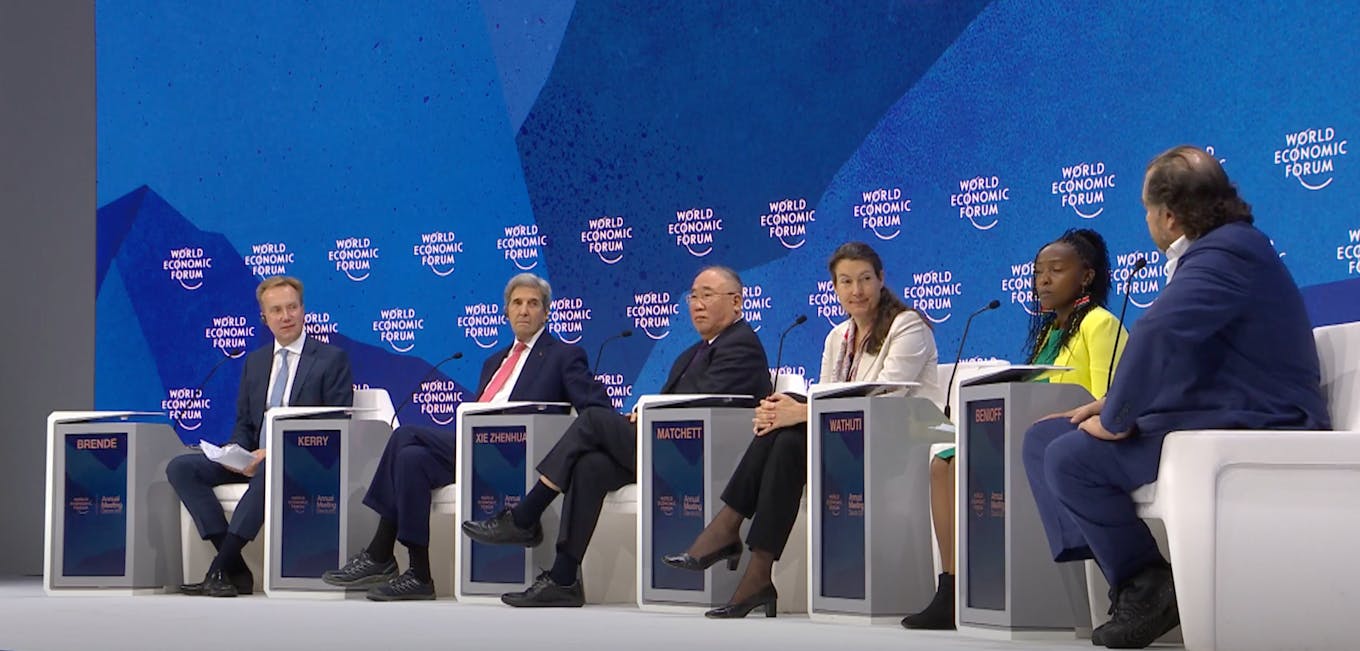The World Economic Forum (WEF) in Davos last week was a chance for China to burnish its environmental credentials as it talked up how it has been pushing for forest regrowth to fight climate change in recent years.
To continue reading, subscribe to Eco‑Business.
There's something for everyone. We offer a range of subscription plans.
- Access our stories and receive our Insights Weekly newsletter with the free EB Member plan.
- Unlock unlimited access to our content and archive with EB Circle.
- Publish your content with EB Premium.
China’s special envoy on climate Xie Zhenhua, in a dialogue with his United States counterpart John Kerry, announced that China was going to plant and conserve 70 billion trees by 2030.
The nation’s forest coverage and its forest stock volume, defined as the total volume of all living trees in a given forested area, have both maintained steady growth over the past 30 years; the country has realised more growth in forest resources than any other country and its forest cover expansion has increased the planet’s total tree canopy by an estimated 25 per cent, said Xie.
“Our new pledge will help to green the planet, fight climate change and enhance the world’s ‘forest carbon sink’,” said Xie.
China’s tree-planting promise comes as part of the One Trillion Trees initiative, a global reforestation plan unveiled at the WEF two years ago. Forest preservation and tree planting are seen as natural climate solutions that together can lock-in enough carbon by 2030 to prevent catastrophic warming.
There are environmentalists, however, who are wary when tree-planting efforts are perceived as feel-good cures for climate change, and become a substitute for reducing emissions, especially when they are marketed as large-scale, state-driven initiatives.
“
Single-minded tree planting is doomed to damage the planet. It is robbing Peter (biodiversity) to pay Paul (climate), and it is not even paying enough.
Li Shuo, senior climate and energy policy officer, Greenpeace East Asia
In China’s case, said senior climate and energy policy officer at Greenpeace East Asia Li Shuo, the world should not be reading too much into the ‘70 billion number’.
“The Chinese commitment is to ‘conserve, restore, manage and plant’ when it comes to afforestation, but note that it did not say how many trees each specific action refers to, nor did it provide further details on implementation,” said Li. “Without that, it is not possible to evaluate the climate and ecological impact of China’s latest announcement.”
‘Robbing Peter to pay Paul’
Some of China’s biggest polluters have more sway over climate change than entire countries, with carbon emissions equivalent to that of entire developed nations. Li told Eco-Business that forest management has its role in combating climate change, but the real solutions are still “deep transformations” in China’s energy and transportation sectors.
Li noted that this year’s Davos had been “bullish” on the topics of afforestation and carbon offsets. “I only wish that we could offset our way out of the climate crisis…Single-minded tree planting is doomed to damage the planet. It is robbing Peter (biodiversity) to pay Paul (climate), and it is not even paying enough.”
Tree-planting activities are not new to China. In 1979, China designated March 12 as its National Tree-Planting Day. The National People’s Congress, China’s top legislature, launched a nationwide voluntary tree-planting campaign in 1981, stipulating that every able-bodied citizen above 11 should plant three to five trees each year.
With China pledging to peak carbon emissions by 2030 and achieve carbon neutrality by 2060, the nation’s leaders have been trying to intensify efforts to plant more trees across different regions, acknowledging that this will also bring in economic benefits and boost grain production. In October last year, China released its white paper on biodiversity conservation.

Chinese special envoy on climate Xie Zhenhua (third from left) and his United States counterpart John Kerry (second from left) participated in a Davos forum, moderated by WEF president Børge Brende (first from left) last week. Other panellists include (from right) Salesforce chair Marc Benioff, founder of Green Generation Initiative Elizabeth Wathuti and co-chief executive of Royal DSM NV Geraldine Matchett. Image: WEF
What was missing from Davos was a definite date for COP15, a key United Nations nature summit, which it was scheduled to hold this year. Plagued by Covid-19 lockdowns, China has been unable to name a date for the convention, and this is after two years of delays.
Media reports say that the United Nations will now draw up a range of alternative venues for COP15 and make a decision before the final round of pre-COP15 negotiations in Nairobi at the end of June. The United Kingdom, Canada and Turkey are all possible destinations if the event is moved, according to British daily The Guardian, although China would retain the presidency of the summit.
At a separate Davos session that focused on China’s energy transition, Zhang Zhigang, president of the State Grid Corporation of China, outlined the initiatives and programmes under way as the nation transitions to lower carbon energy sources.
There is an “energy revolution” unfolding in China, he said. Hydrogen and wind energy will be prioritised to replace coal and fuel in the world’s second largest economy.
China is expected to have the largest cumulative installed offshore wind capacity globally and surpass the European Union and UK combined by the end of this year, according to the International Energy Agency.
We are “very confident of reaching our goal”, said Zhang.
US special envoy for climate Kerry, in a message seemingly directed at China, reminded nations that the current Russia-Ukraine crisis should not be an excuse to dial back on efforts to move towards renewables.
“Now Ukraine’s invasion is being used as a lever to highlight the need for energy security. Nobody doubts that there are challenges to meet current energy demands, but that does not mean that we should drill a lot more, pump a lot more or build more infrastructure to make up for what Russia is cutting us out from,” said Kerry.
Kerry also reiterated the agreement to “phase down on coal” that was reached at COP26 last year in Glasgow.
“Climate is not a bilateral relationship between the US and China. Climate is a multilateral, universal and existential issue for everyone, and unless China and the US try and find a way forward, we cannot get to where we need to go,” he said.










